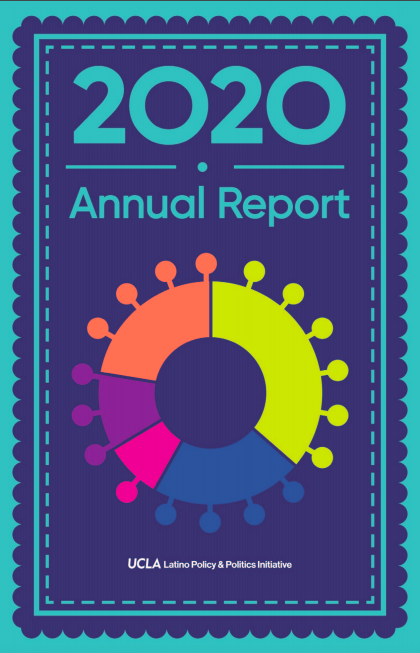The UCLA Latino Policy & Politics Initiative (LPPI) addresses the most critical domestic policy challenges facing Latinos and other communities of color through research, advocacy, mobilization, and leadership development to propel policy reforms that expand genuine opportunity for all Americans. As their website states, there is no American agenda without a Latino agenda. In their 2020 Annual Report, the LPPI produced research on a variety of topics affecting the Latino community amidst a global pandemic, a year of racial reckoning and a presidential election with historic Latino turnout. Read on to learn more about the report’s findings and the LPPI’s work to uplift the unique needs of the Latino community.

The 36-page report begins by recognizing the challenges and opportunities that the year 2020 brought. “With a global pandemic putting a spotlight on inequity and the needs of our must vulnerable communities, it was made painfully clear just how integral Latinos are to the fabric of our country,” the report reads, highlighting the well-documented disproportionate effects of the coronavirus pandemic on the Latino community. And despite the obstacles, Latinos and other communities of color turned out in record numbers during the most consequential presidential election of our time, providing the key margins in swing states that put President Joe Biden in the White House.
The report is then split into various initiatives, beginning with “Research that Saves Lives: COVID-19 through a Latino Lens.” The LPPI produced important research to show the effects of the coronavirus pandemic from a Latino perspective, including how COVID-19 shelter in place policies affected Los Angeles Country’s Black and Latino neighborhoods and highlighting the challenges that undocumented immigrants, who are essential for the economy but excluded from coronavirus relief, have faced throughout the pandemic.
The “Battle for the Future of Democracy” initiative focused on the 2020 presidential election and the Latino electorate. Through election-focused research about the top issues for Latino voters in swing states and the vote choices of Latino voters, the LPPI explored the growing political power of the Latino community and the impact of the Latino vote. Through the UCLA Voting Rights’ Project, the LPPI focuses on creating an accessible and equitable system of voting for all Americans through impact litigation, research, and clinical education, aiming to train a new generation of voting rights lawyers, expert witnesses, and policy makers.
Through the “Mobilizing for Representation that Matters” initiative, LPPI actively engages in advocating for a more inclusive democracy that fully integrates the perspectives and needs of Latinos, who are the largest non-white population in the country and the plurality in states like California. Partnered with the National Association of Latino Elected and Appointed Officials, the LPPI helped elected officials in Arizona navigate the shifting political realities that, as we know, resulted in turning Arizona blue for the first time in over two decades last November. The LPPI also played an important role in advocating for a Latino to replace Vice President Kamala Harris in the Senate, ultimately resulting in Senator Alex Padilla becoming the state’s first Latino senator. Through the 2020 Latino Agenda initiative, the LPPI produced a 21st Century Latino agenda focused on policy recommendations to improve opportunities for the Latino community, which has been shared with state and federal elected officials and serves as a roadmap for inclusive policy for advocates.
“The Future of our Nation: Shaping a New Narrative” initiative puts a spotlight on the contributions of Latinos to the United States, especially the outsized role they have played during the pandemic as essential workers, to ensure that Latinos are both visible across key policy debates and that their stories are told by Latino/a experts. By coming together with journalists, elected officials, academic experts, and community leaders, the LPPI organized events and conversations ranging from the vulnerabilities of immigrant communities amid natural disasters to creating greater solidarity between Black and Brown communities.
Lastly, the “Building the Leaders of Today and Tomorrow” initiative counteracts the underrepresentation of the Latino community by investing in the civic leaders of tomorrow. The Fellows Program gives undergraduate, professional and graduate students the opportunity to participate in action-oriented research and policy advocacy to prepare them to inform a better and more representative tomorrow.
To read the full UCLA Latino Policy & Politics Initiative 2020 Report, click here.
